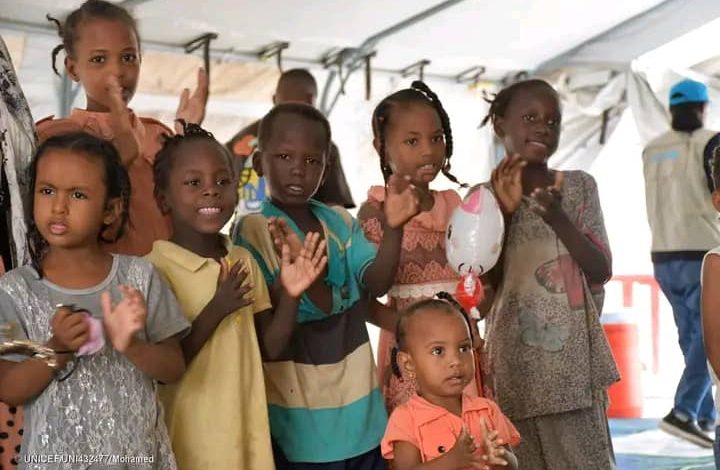UNICEF: Sudan Among First to Ratify CRC

Sudan Events/Haffiya Elyas
World Children’s Day was first established in 1954 as Universal Children’s Day and is celebrated on 20 November each year to promote international togetherness, awareness among children worldwide, and improving children’s welfare.
November 20th is an important date as it is the date in 1959 when the UN General Assembly adopted the Declaration of the Rights of the Child. It is also the date in 1989 when the UN General Assembly adopted the Convention on the Rights of the Child (CRC).
World Children’s Day is UNICEF’s annual day of action for children, by children, marking the adoption of the Convention on the Rights of the Child.
Children’s rights are human rights. But in too many places today, children’s rights are under attack.
UNICEF pointed out that every passing day, the needs of these children increase, and the youngest are struggling to survive. Destruction of healthcare facilities, disruption of critical healthcare services like immunizations, newborn care and unavailability of healthcare workers is putting many at risk of death and life-threatening complications.
Across the country, brave and resilient, humanitarian workers remain at the frontline providing relief, hope and much needed care for those in need especially children.
Convention on the Rights of the Child:
Thirty-three years ago, world leaders made a historic commitment to the world’s children by adopting the United Nations Convention on the Rights of the Child – an international agreement on childhood.
It’s become the most widely ratified human rights treaty in history and has helped transform children’s lives around the world. But still not every child gets to enjoy a full childhood. Still, too many childhoods are cut short.
Leaders from government,business and communities fulfil their commitments and take action for child rights now, once and for all.
In August 1990, Sudan ratified the Convention on the Rights of the Child – one of the first countries to do so.
The government of Sudan reaffirmed its’ commitment to uphold these rights for all children of Sudan, so that they may grow to realize their full potential and contribute towards society and nation-building.
Sudan is continuing its commitments to children for a safe childhood and activating all regional and global laws ratified by Sudan and arranging mechanisms for the protection of children in the armed conflict areas.
Since the ongoing brutal war in Sudan broke out on 15 April, UNICEF calls for the redoubled commitment by the international community and all parties in the conflict to address the plight of millions of children and families who are living through a relentless nightmare day after day. Children continue to pay the highest price for a crisis not of their making, increasingly with their own lives.
“Sudan is now the largest child displacement crisis in the world, with a recorded 3 million children fleeing widespread violence in search of safety, food, shelter and health care—most within Sudan—while hundreds of thousands are sheltering in sprawling make-shift camps in neighboring countries.
“Children continue to bear the heaviest brunt of the violence. Some 14 million children in Sudan are in urgent need of life-saving humanitarian assistance. Many of them are living in a state of perpetual fear—fear of being killed, injured, recruited or used by armed actors, according to UNICEF.
“Reports of conflict-related sexual violence, including rape, have been rampant, and with fighting only intensifying in places like Khartoum, Darfur, and Kordufans, the very real worry is that child rights violations will continue to spike.
Under Threat:
So far, UNICEF has received allegations of over 3,100 severe violations, including the killing and maiming of children.
“Meanwhile, none of Sudan’s children have been able to return to school, with the future of an entire generation now hanging in the balance. A staggering 19 million children in Sudan are unable to return to classrooms, making it one of the worst education crises in the world. “UNICEF and partners are providing life-saving assistance to millions of children inside Sudan and in neighboring countries, including water, health, nutrition, safe spaces and learning. But with needs outpacing resources, time is running out. We need safe and unhindered humanitarian access to deliver life-saving supplies and services to reach every child in need.
“The looming threat of deadly diseases – such as cholera, dengue, measles and malaria – is also on the rise, with outbreaks already expanding. Today, around 7.4 million children lack safe drinking water. Nearly half of those are under the age of five and at serious risk of diarrheal diseases and cholera. Many others lack routine vaccinations against easily preventable diseases, while nearly 700,000 children with severe acute malnutrition are at risk of dying without treatment. Water and health infrastructure must be preserved as per international humanitarian law.
Meanwhile, UNICEF’s humanitarian appeal for this year is only 24 per cent funded.
“We cannot allow the death and suffering of millions of children in Sudan to become another forgotten humanitarian catastrophe. These children need our support now. And most of all, they need peace.” UNICEF added.



